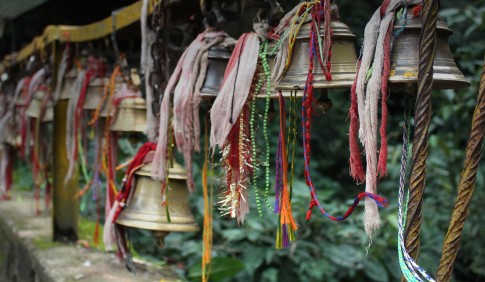Myanmar (4-Week Sample Itinerary)
The following is a sample itinerary based on past courses; actual itineraries may vary.
| Week 1: Bagan, Mount Popa | Our travels begin in Yangon, our gateway to exploring the golden land of Myanmar. After a night of much needed rest we board our plane to Bagan, the ruined crimson capital of the 9th century Kingdom of Pagan. Here on the banks of the Irrawaddy River, we settle into the pace of the life in Myanmar’s dry zone and acclimate to the culture, language, and cuisine of the land. We begin lessons on the complex history of Myanmar from ancient times through the colonial period to independence, military rule and the current democratic movement. The political transformations that have galvanized a country of overwhelming cultural diversity (135 ethnic groups) serve as our focus of inquiry throughout the four-week course. From Bagan we move west toward Mt Popa, where we trek with pilgrims to the sacred mountaintop to offer alms and make merit. |
|---|---|
| Week 2: Shan State Homestays, Inle Lake | From Mount Popa we make our way to remote Shan State where we will trek through stunning hills and lush paddy fields to remote hill tribe villages. Individual homestays with local Palaung and Danu families will provide an up close window to life in Myanmar’s border regions and plenty of opportunity to practice and develop our language skills. Through sharing chores, meals and stories with our host families we will learn more about ethnic relationships and resource conflict issues in the area and gain insight into how recent reforms are affecting Myanmar’s rural communities. Bidding our new families farewell we end our trek at the edge of idyllic Inle Lake where we board long-tail boats to Nyaungshwe, a lakeside village where will have time to reflect, process and debrief our experiences so far. |
| Week 3: Mandalay | From Nyaungshwe we travel to Mandalay. After greeting our Buddhist friends at Phaung Daw Oo we will venture into Mandalay’s Muslim quarter. Over a home-cooked meal with community leaders involved in the local interfaith movement we will learn about Muslim culture in Myanmar and what is being done locally to extinguish religious tensions and promote peace. Here we begin our studies of Theravada Buddhism, which deepen when we reach Mandalay, Myanmar’s last royal capital. There we take our packs off at Phaung Daw Oo, a local monastic school that provides free education to 6,000 students and novice monks. Using the school as our home base we explore the old city, retreating from the heat in the afternoon to quiet temple corners and some of Mandalay’s most sacred hills for introductions into Myanmar’s history, language and religion, including the practice of meditation. In the evening we connect and share life stories with Phaung Daw Oo’s students, learning through individual stories the central role monastic education plays in local development. |
| Week 4: Hpa'an & Yangon | From Mandalay we board a night bus to Hpa’an, the capital of Karen State. In the shadow of Karen State’s limestone mountains we will meet with local leaders and learn about the rich history and culture of the Karen people, including their 30-year conflict with the Myanmar military. Continuing language lessons will give ample opportunity to interact and connect with community. Finally we board a train bound for Yangon, Myanmar’s largest and most cosmopolitan city. There, students receive an authentic introduction to the smells, tastes, sounds and hectic nature of the city. As a group we will also meet with key development organizations and political groups to hear what some of the country’s most influential leaders have to say about Myanmar’s past, present and future – a macro perspective, giving us an excellent juxtaposition to our month of community-based learning. |

